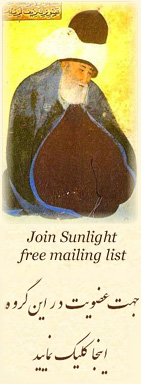Here, Sunlight offers three presentations of Ghazal 1374,
accompanied by a link to mixed media:
^ ^ ^ ^ ^
O lovers
Love will lay a carpet of treasures under your feet.
Musicians
Love will fill your drums with gold.
Thirsty ones
Love will turn your scorched desert
into a meadow of paradise.
Forsaken ones
Love will open the doors to the King's palace.
Alchemists
Love's alchemy will reshape gallows into altars.
Sinners
Love will change your apathy to faith.
Kings of the world
in love's hands you will melt like a candle.
To the parched lips of those who are
willing to surrender
Love will bring the wine that changes darkness
into vision, cruelty into compassion
and dust into precious incense.
Those who think the heart is only in the chest
take two or three steps and are content.
The rosary, the prayer rug and repentance
are paths that they mistake for the destination.
-- Translation by Azima Melita Kolin
and Maryam Mafi
"Rumi: Hidden Music"
HarperCollins Publishers Ltd, 2001
~ ~ ~ ~ ~ ~ ~
A BALL OF WAX
O lovers! O lovers! -
I can turn dust into diamonds!
O minstrels! O minstrels!
I can fill your tambourines with gold!
O thirsty souls! O thirsty souls!
I can give you water to drink,
I can turn this dustbin
into the flowing waters of paradise!
O beggar! O beggar!
Your desperate call is over.
I can turn your aching heart
into the King's crown!
O love! O love!
Pour down on this world.
I can turn every ruin into a mosque,
every gallows into a pulpit.
O skeptics! O skeptics!
I can open your heart!
I can pull the strings
that turn people toward doubt or faith.
O braggers! O braggers!
You are a ball of wax in my hand!
Become a sword
and I will turn you into a cup.
Become a cup
and I will turn you into a sword.
You began as a drop of semen,
then you became blood.
Now you have attained this wonderful form.
Come to me, O son of Adam,
I will make you even more beautiful.
I can turn sorrow into joy,
I can turn a wild beast into Joseph,
I can turn poison into nectar,
I can find all those who have gone astray.
O Saaqi! O Saaqi!
My mouth is open wide.
Let every dry mouth
be joined to the lip of your cup.
O garden! O garden!
Let me use your roses for my rosary
and I will let your flowers bloom in my heart.
O Heaven! O Heaven!
You'll be more confused than the narcissus
when I change dust into ambergris,
thorns into jasmine.
O Wisdom! O Wisdom!
You are the King of Truth
who offers a treasure to all those who ask.
Why should I say another word? -
What could I add to your endless giving?
-- Version by Jonathan Star
"Rumi - In the Arms of the Beloved "
Jeremy P. Tarcher/Putnam, New York 1997
~ ~ ~ ~ ~ ~ ~
Oh lovers! Oh lovers! I turn dust into gems! Oh
minstrels! Oh minstrels! I fill your tambourines with gold!
Oh thirsty souls! Oh thirsty souls! Today I am
giving water to drink! I will transform this dustbin into
paradise, a celestial pool.
Oh helpless men! Oh helpless men! Relief has
come! Relief has come! I turn everyone with a wounded and
aching heart into a sultan, a Sanjar.
Oh elixir! Oh elixir! Look at me, for I transmute
a hundred monasteries into mosques, a hundred gallows into
pulpits!
Oh unbelievers! Oh unbelievers! I unfasten your
locks! For I am the absolute ruler: I make some people
believers, others unbelievers!
Oh sir! Oh sir! You are wax in my hands! If
you become a sword, I will make you a cup; if you become a
cup, I will make you into a sword.
You were a sperm-drop and became blood, then
you gained this harmonious form--come to me, oh son of
Adam! I will make you even more beautiful.
I turn grief into joy and guide the lost, I make
the wolf into Joseph and poison into sugar!
Oh sakis! Oh sakis! I have opened my mouth in
order to marry every dry lip to the lip of the cup!
Oh rosegarden! Oh rosegarden! Borrow roses
from my rosery! Then I will place your sweet herbs next to
the lotus.
Oh heaven! Oh heaven! You will become even
more bewildered than the narcissus when I make dust into
ambergris, thorns into jasmine.
Oh Universal Intellect! Oh Universal Intellect!
Whatever you say is true. You are the ruler, you are
munificent-- let me stop my speaking.
-- Translation by William C. Chittick
"The Sufi Path of Love"
SUNY Press, Albany, 1983
The image:http://img.photojerk.com/nwInQUvF1.jpg^ ^ ^ ^ ^

"The wolf into Joseph, and poison into sugar"






